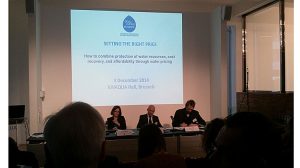WFD cost recovery principle fit for the future?

-
 Fergal MacErlean
Fergal MacErlean
Share article:
One of the key features of the Water Framework Directive (WFD) is the references to economics, specifically the cost recovery principle. Under the Directive, EU member states are mandated to recover the financial, environmental and resource costs of using water. But an emerging question is whether cost recovery remains a viable option in the future.
This critical topic was discussed as part of a joint project by the European Commission DG Environment and the OECD Environment Directorate in workshops on various dimensions of the economic pillar of the WFD as detailed in the 2023 OECD Studies on Water: Implementing Water Economics in the EU Water Framework Directive.
Cost recovery is a foundational feature of the WFD. It relates to issues of fairness, the effectiveness of public expenditures and the creditworthiness of water service providers. The workshop participants (government representatives, associations of water utilities and regulators, research institutions, and NGOs) stressed that affordability needs to be thoroughly assessed and that this aspect is best addressed through targeted social measures than through complex – often regressive – tariff structures. Cost recovery is also necessary to include investments in infrastructure.
Water-pricing mechanisms
While pricing can sometimes be an effective incentive to save water, reducing consumption can cause significant problems for operators. Crucially this means that water utilities have no incentive to encourage water saving. There was a consensus that affordability problems are better addressed through targeted social measures, rather than social tariffs. It was noted however that targeted social measures only apply if a robust social system is in place, though this is usually the case in Europe. Participants mentioned the lack of willingness to pay and political considerations related to tariff setting. The benefit of an independent economic regulator for water supply and sanitation could solve many of these problems.
Efficient (innovative) cost-recovery mechanisms
Apart from abstraction and pollution, charges on other pressures represent a very small percentage of the total funding for water management in the EU. These instruments have an untapped potential for raising additional funds for water management. Land Value Capture (LVC) is a policy approach that enables communities to recover and reinvest land value increases that result from public investment and government actions. LVC is attractive from a public finance point of view but is under-used in the water sector. LVC has a lot of potential for climate action, and could be applied in the water sector as water infrastructures can have a positive impact on land value. Participants mentioned examples of applications in Australia, South Korea and Morocco.
How fit is cost recovery for the future?
With the Zero Pollution Action Plan, driven by several environmental Directives, the course of direction is clearly towards more stringency, with increased costs for society as a whole. The implications for customers of funding environmental improvements through water charges is stark in sparsely populated areas, such as Estonia and Lithuania, as there is a steep cost-curve associated with such areas. It was discussed that consolidation of payments for environmental improvements may be important to allow for a better alignment between the costs and benefits of meeting requirements. And it was found that flexibility in the delivery of environmental improvements can be particularly important where the efficient plant size is likely to be small.














